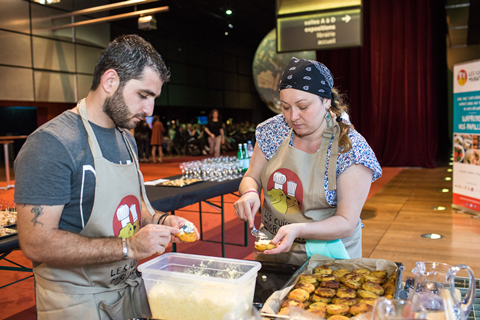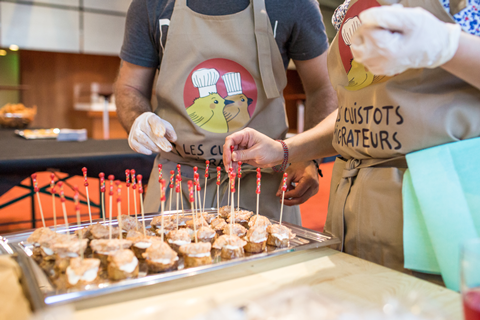
Global governance
France has an appetite for cultural diversity, says Co-founder of catering venture the Migratory Cooks
"Les Cuistots Migrateurs" is an innovative venture that employs the culinary skills of migrants arriving in France. The International Chamber of Commerce (ICC) has asked the company to cater the #PeoplePlanet 2016 Photographic Award Gala Reception.
“The Migratory Cooks” are in high demand across Paris’s famous food scenes, and a recent New York Times feature has helped to further raise their profile.
The brainchild of Sebastien Prunier and Louis Jacquot, Les Cuistots Migrateurs aims foremost to create jobs and change the narrative on refugees and migrants. Here’s what Co-founder Sebastien Prunier had to say when we asked what inspired the venture.
How did you get the idea for “Les Cuistots Migrateurs” (The Migratory Cooks)?
Sebastien Prunier: We started from the premise that there was a need for integration in the current “migration crisis”, and one of the most effective ways to do this is to employ the skills of migrants. The idea to do this through food came later on, with the realisation that if we found refugee cooks, it would bring a new culinary offering to France: an authentic world cuisine that’s more diverse, with new recipes, more human contact, an invitation to travel…
What does Sustainable Development Goals 16: Peace, justice and strong institutions mean to you?
SP: In my view, there is a causal relationship between peace and justice. More justice creates more peace, more peace provides the conditions for a fairer world. A just world has notably less disparity in living conditions and greater solidarity when facing certain difficult or tragic situations. We all have a responsibility in the state of our world, and we can all feel good by acting and contributing… So let’s do it! Institutions, citizens, businesses all have a role to play.
Work is the biggest factor of integration, and refugees are struggling to find a job in their first years of arrival in France.
Do you think Les Cuistots Migrateurs can improve the perception of migrants?
SP: Improving the way society views migration is one of our primary objectives.
The image we have of migration in France is disastrous. They are often perceived negatively, as dangerous sources of problems. However, in reality, migration is a very positive phenomenon: bringing new ideas, new ways of doing things, the richness of different cultures, etc. Moreover, interaction with the local community offers a new source of creativity, reexamination and reinvigoration, etc.
In a world that is becoming ever more multicultural, it is essential to always remember that migration is positive. We must build a harmonious multicultural society; it’s one of the obligations of our time. We need more tolerance, more open-mindedness. Without these, community segregation, division, tensions and violence…will ensue.
At Les Cuistots Migrateurs, we hire refugee chefs who cook traditional dishes from their countries (Chechnya, Iran, Ethiopia, Syria, etc.) and offer these through caterers, street food vendors and hopefully soon via a restaurant.
It’s been six months since we launched and have already served more than 5,000 meals, with very positive feedback. Yes, there is a French appetite for diversity. I strongly believe in our work of showcasing cultural know-how and making unfamiliar cultures more visible.
I hope other initiatives will follow with the same desire to employ the skills of refugees by recruiting them in all fields.
What are people’s reactions to your company Les Cuistots Migrateurs, and the idea in general to include migrants in our society through their talents?
SP: We provide a unique link between locals and migrants, an example of co-construction using food, and many in France have expressed their goodwill in regards to the project and their desire to participate.
We have received, since our launch, an exceptional reception from the public, and much encouragement. This in no way reflects the identity-driven reactions and fear of foreigners that we hear all too often. It’s reassuring and exciting.
I would add in conclusion that it is surprising and sad to see that people are unaware of our ability to employ people with refugee status. Work is the biggest factor of integration, and refugees are struggling to find a job in their first years of arrival in France (the unemployment rate is 26% for those who arrived here within the last five years…).
I hope other initiatives will follow with the same desire to employ the skills of refugees by recruiting them in all fields.




